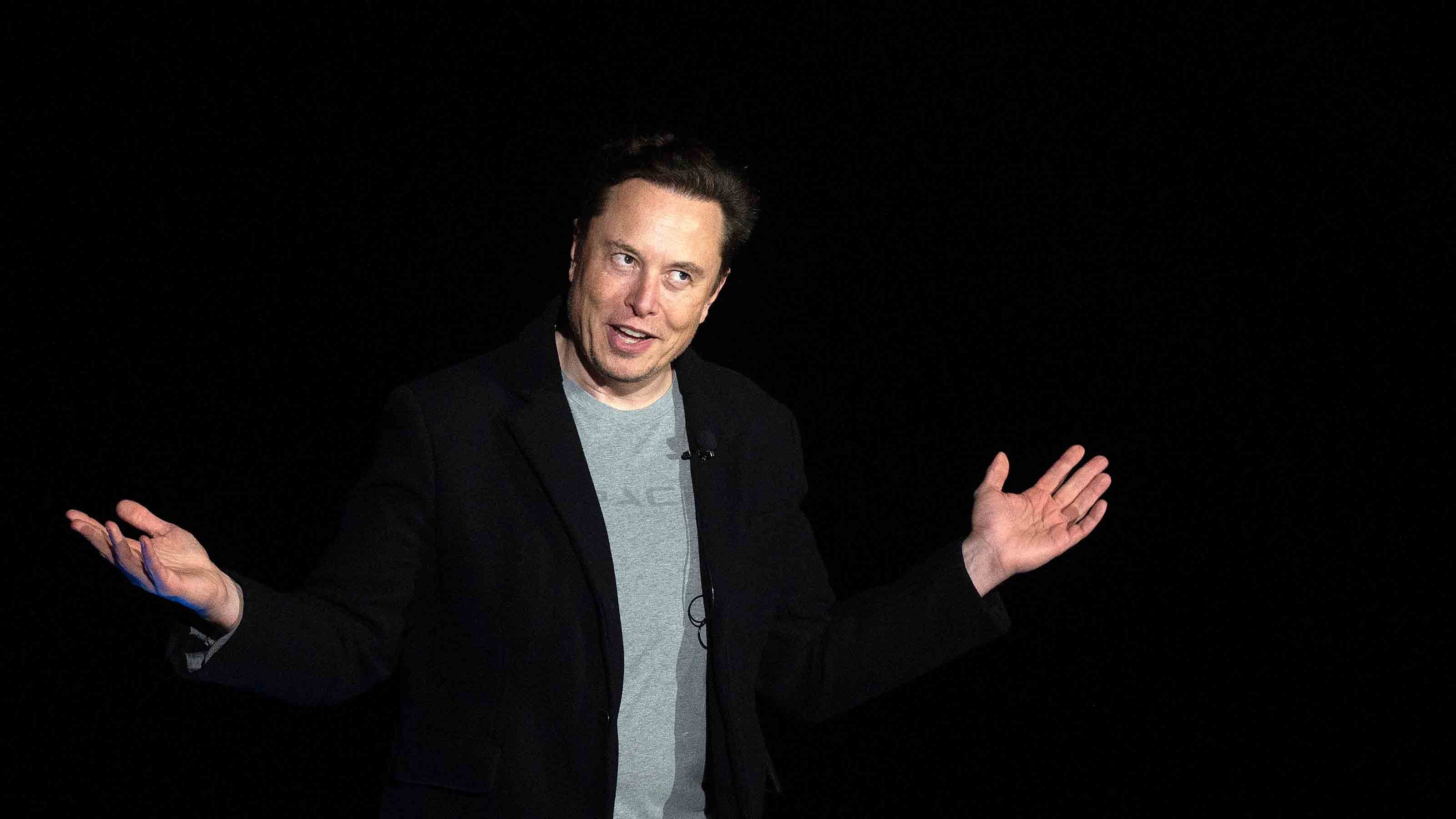Musk's Twitter Buyout Offer Means the Endgame Is Near
Tesla CEO's $54.20-per-share bid for TWTR is a 'best and final' offer that will either see Musk rebuffed or Twitter taken private.


Profit and prosper with the best of Kiplinger's advice on investing, taxes, retirement, personal finance and much more. Delivered daily. Enter your email in the box and click Sign Me Up.
You are now subscribed
Your newsletter sign-up was successful
Want to add more newsletters?

Delivered daily
Kiplinger Today
Profit and prosper with the best of Kiplinger's advice on investing, taxes, retirement, personal finance and much more delivered daily. Smart money moves start here.

Sent five days a week
Kiplinger A Step Ahead
Get practical help to make better financial decisions in your everyday life, from spending to savings on top deals.

Delivered daily
Kiplinger Closing Bell
Get today's biggest financial and investing headlines delivered to your inbox every day the U.S. stock market is open.

Sent twice a week
Kiplinger Adviser Intel
Financial pros across the country share best practices and fresh tactics to preserve and grow your wealth.

Delivered weekly
Kiplinger Tax Tips
Trim your federal and state tax bills with practical tax-planning and tax-cutting strategies.

Sent twice a week
Kiplinger Retirement Tips
Your twice-a-week guide to planning and enjoying a financially secure and richly rewarding retirement

Sent bimonthly.
Kiplinger Adviser Angle
Insights for advisers, wealth managers and other financial professionals.

Sent twice a week
Kiplinger Investing Weekly
Your twice-a-week roundup of promising stocks, funds, companies and industries you should consider, ones you should avoid, and why.

Sent weekly for six weeks
Kiplinger Invest for Retirement
Your step-by-step six-part series on how to invest for retirement, from devising a successful strategy to exactly which investments to choose.
If it wasn't obvious before, Elon Musk was never going to be a "passive" shareholder in Twitter (TWTR, $45.85).
The Tesla (TSLA) CEO and world's richest person offered to buy the social media platform for $54.20 per share in cash, according to filings with the Securities and Exchange Commission late Wednesday. Musk's Twitter buyout offer translates into about $43 billion.
The bid represents a premium of 18.2% to TWTR's Wednesday closing price, and a 38% premium to where it traded before Musk disclosed his original 9.1% ownership stake in early April.
From just $107.88 $24.99 for Kiplinger Personal Finance
Become a smarter, better informed investor. Subscribe from just $107.88 $24.99, plus get up to 4 Special Issues

Sign up for Kiplinger’s Free Newsletters
Profit and prosper with the best of expert advice on investing, taxes, retirement, personal finance and more - straight to your e-mail.
Profit and prosper with the best of expert advice - straight to your e-mail.
Most powerfully, Musk notes that his buyout price for Twitter represents a whopping 54% premium to what he paid when he first began building his position in late January.
Musk intends to take Twitter private, saying the company has "extraordinary potential. I will unlock it."
Musk's Twitter Buyout Offer: As Good as It Gets?
The mercurial billionaire made clear this is a take-it-or-leave it buyout offer, saying in the filing that "I am not playing the back-and-forth game. I have moved straight to the end. It's a high price and your shareholders will love it."
More worrisome: Musk essentially threatened to dump his TWTR holdings should Twitter reject his bid.
"If the deal doesn't work, given that I don't have confidence in management nor do I believe I can drive the necessary change in the public market, I would need to reconsider my position as a shareholder," Musk said.
As Twitter's single largest shareholder, Musk's threat needs to be taken seriously, especially given his history of, shall we say, unpredictable behavior.
After all, Twitter thought it had reached a sort of detente with Musk only days ago. The Tesla CEO was offered a seat on the board of directors in exchange for a commitment to purchase no more than 14.9% of Twitter's shares outstanding.
But Musk almost immediately changed his mind and declined board membership. The fact that directors are fiduciaries, and therefore are restricted in what they can publicly say (and tweet) about the corporations they serve, presumably factored into his thinking.
The latest chapter in this drama leaves Twitter investors – to say nothing of Twitter management and its board – in a bind.
Musk's interest in TWTR provided a much-needed catalyst. Shares lost 20% in 2021, a year in which the S&P 500 gained 27%. They were big-time market laggards in 2022 too – until Musk disclosed his interest.
The Twitter buyout offer has some analysts advising clients to get out while the getting is good. CFRA Research analyst Angelo Zino downgraded TWTR to Hold from Buy Thursday, saying most of the upside he forecast has been achieved.
"The offer price should be viewed as enticing to shareholders and will be difficult to reject," Zino writes. "If rejected, we fear Musk could walk away rather than raise his offer (we take him for his word), which would likely drive shares considerably lower. At current levels, we downgrade as our thesis has largely played out."
That's putting it diplomatically. If some market participants disliked TWTR stock before Musk got involved, they really can't stand it at current levels.
Then there's Wedbush analyst Daniel Ives, who believes Musk will prevail.
"Ultimately we believe this soap opera will end with Musk owning Twitter after this aggressive hostile takeover of the company," says Ives, who rates TWTR at Outperform (equivalent of Buy). "It would be hard for any other bidders/consortium to emerge and the Twitter board will likely be forced to accept this bid and/or run an active process to sell Twitter."
The market, for its part, is taking a more skeptical view. Twitter's price action suggests this is far from a done deal. Note that TWTR shares were trading around $46.50 early in Thursday's session – well below Musk's buyout offer of $54.20.
Bottom Line
Musk already has Tesla, SpaceX and the Boring Company in his considerable portfolio of responsibilities. As such, a successful Twitter coup d'etat has all the makings of a "be careful what you wish for" outcome.
As Bloomberg's Matt Levine once wrote, Musk owning 9% of Twitter makes him Twitter's problem. "If Elon Musk buys Twitter, Twitter is his problem."
And Musk certainly has plenty of problems as it is. Indeed, we shouldn't forget yet another constituency that's less-than-enamored of Musk's latest jape: Tesla shareholders.
The electric vehicle manufacturer's stock slumped after Musk disclosed his Twitter bid, and it's not hard to guess why.
"As the CEO of a trillion-dollar company, Elon Musk should focus on Tesla and not waste time attempting to acquire and manage a $43 billion company," says David Trainer, CEO of New Constructs, a Nashville-based investment research firm.
Twitter stock is up more than 50% from its 52-week low, but every investor's cost basis is different. Just remember: There's no shame in plotting an exit from what has been a very frustrating stock for a very long time.
Profit and prosper with the best of Kiplinger's advice on investing, taxes, retirement, personal finance and much more. Delivered daily. Enter your email in the box and click Sign Me Up.

Dan Burrows is Kiplinger's senior investing writer, having joined the publication full time in 2016.
A long-time financial journalist, Dan is a veteran of MarketWatch, CBS MoneyWatch, SmartMoney, InvestorPlace, DailyFinance and other tier 1 national publications. He has written for The Wall Street Journal, Bloomberg and Consumer Reports and his stories have appeared in the New York Daily News, the San Jose Mercury News and Investor's Business Daily, among many other outlets. As a senior writer at AOL's DailyFinance, Dan reported market news from the floor of the New York Stock Exchange.
Once upon a time – before his days as a financial reporter and assistant financial editor at legendary fashion trade paper Women's Wear Daily – Dan worked for Spy magazine, scribbled away at Time Inc. and contributed to Maxim magazine back when lad mags were a thing. He's also written for Esquire magazine's Dubious Achievements Awards.
In his current role at Kiplinger, Dan writes about markets and macroeconomics.
Dan holds a bachelor's degree from Oberlin College and a master's degree from Columbia University.
Disclosure: Dan does not trade individual stocks or securities. He is eternally long the U.S equity market, primarily through tax-advantaged accounts.
-
 4 Estate Planning Documents Every High-Net-Worth Family Needs
4 Estate Planning Documents Every High-Net-Worth Family NeedsThe key to successful estate planning for HNW families isn't just drafting these four documents, but ensuring they're current and immediately accessible.
-
 Love and Legacy: What Couples Rarely Talk About (But Should)
Love and Legacy: What Couples Rarely Talk About (But Should)Couples who talk openly about finances, including estate planning, are more likely to head into retirement joyfully. How can you get the conversation going?
-
 How to Get the Fair Value for Your Shares in This Situation
How to Get the Fair Value for Your Shares in This SituationWhen a sale of substantially all corporate assets is approved by majority vote, shareholders on the losing side of the vote should understand their rights.
-
 If You'd Put $1,000 Into AMD Stock 20 Years Ago, Here's What You'd Have Today
If You'd Put $1,000 Into AMD Stock 20 Years Ago, Here's What You'd Have TodayAdvanced Micro Devices stock is soaring thanks to AI, but as a buy-and-hold bet, it's been a market laggard.
-
 Dow Rises 313 Points to Begin a Big Week: Stock Market Today
Dow Rises 313 Points to Begin a Big Week: Stock Market TodayThe S&P 500 is within 50 points of crossing 7,000 for the first time, and Papa Dow is lurking just below its own new all-time high.
-
 Nasdaq Leads Ahead of Big Tech Earnings: Stock Market Today
Nasdaq Leads Ahead of Big Tech Earnings: Stock Market TodayPresident Donald Trump is making markets move based on personal and political as well as financial and economic priorities.
-
 11 Stock Picks Beyond the Magnificent 7
11 Stock Picks Beyond the Magnificent 7With my Mag-7-Plus strategy, you can own the mega caps individually or in ETFs and add in some smaller tech stocks to benefit from AI and other innovations.
-
 If You'd Put $1,000 Into UPS Stock 20 Years Ago, Here's What You'd Have Today
If You'd Put $1,000 Into UPS Stock 20 Years Ago, Here's What You'd Have TodayUnited Parcel Service stock has been a massive long-term laggard.
-
 If You'd Put $1,000 Into Lowe's Stock 20 Years Ago, Here's What You'd Have Today
If You'd Put $1,000 Into Lowe's Stock 20 Years Ago, Here's What You'd Have TodayLowe's stock has delivered disappointing returns recently, but it's been a great holding for truly patient investors.
-
 Stocks Extend Losing Streak After Fed Minutes: Stock Market Today
Stocks Extend Losing Streak After Fed Minutes: Stock Market TodayThe Santa Claus Rally is officially at risk after the S&P 500's third straight loss.
-
 If You'd Put $1,000 Into 3M Stock 20 Years Ago, Here's What You'd Have Today
If You'd Put $1,000 Into 3M Stock 20 Years Ago, Here's What You'd Have TodayMMM stock has been a pit of despair for truly long-term shareholders.